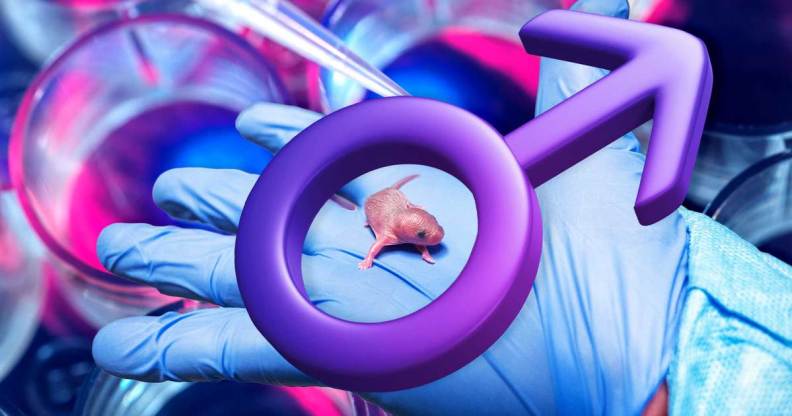Scientists just created mice with two biological dads – and hope to replicate the process with humans

Scientists have been able to replicate gametes in mice to produce a live birth. (Getty)
Scientists have managed to create mice with two biological fathers, which could lead to implications for same-sex reproduction in the future.
Researchers at Kyushu University, in Japan, were able to create lab-grown egg cells by using the skin cells of male mice.
While creating mice with two biological fathers was technically possible prior to the achievement, it involved a series of elaborate steps, including genetic engineering.
After creating stem cells from eight-week-old male mice, scientists manipulated the genetic code of the cell to create a mature egg.
After successful cultivation, the eggs were fertilised and implanted into a surrogate mouse, which eventually resulted in the birth of seven mouse pups.
The breakthrough could revolutionise infertility treatments, as well as potentially create a new method of conception for same-sex couples.
Research director Katsuhiko Hayashi presented the findings at the Third International Summit on Human Genome Editing, at the Francis Crick Institute, in London, on Wednesday (8 March).
He told attendees that studies could potentially result in successful replications with human cells within a decade.
“I don’t know whether they’ll be available for reproduction,” he said. “Purely in terms of technology, it will be possible [in humans]… in 10 years.”
However, some experts have said they are uncertain whether this could be achieved in such a short time frame.
Some suggested the technique would be incredibly challenging to replicate due to the amount of time it takes to cultivate a mature egg cell.
Harvard Medical School dean, professor George Daley, cited research that proves creating lab-grown gametes (the two types of male and female cells that join to make a new creature) from human cells would be more complicated than with mice.
“We still don’t understand enough of the unique biology of human gametogenesis to reproduce Hayashi’s provocative work in mice,” he explained to The Guardian.
Meanwhile, professor Amander Clark, from the University of California Los Angeles, said if successful, it would be a “huge leap” in the field because scientists have yet to create lab-grown human eggs from female cells.
In mice, the efficiency to produce a live birth in the replicated cell proved to be slightly lower than that of a female-derived egg, with about a one per cent efficiency in the surrogate cell versus five per cent of a female egg.
But in human tests, so far, the gametes often stop developing cells before the egg fully matured, meaning that it cannot produce offspring.
“We’re poised at this bottleneck at the moment,” Clark added. “The next steps are an engineering challenge, but getting through that could be 10 or 20 years.”
How did this story make you feel?

